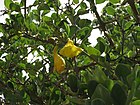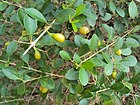Note: This is a project under development. The articles on this wiki are just being initiated and broadly incomplete. You can Help creating new pages.
Difference between revisions of "Gmelina asiatica"
| Line 2: | Line 2: | ||
'''Gmelina asiatica''' is a deciduous, usually spiny, straggling or scrambling, much-branched shrub or small tree that can grow up to 8 metres tall, but is more likely to be around 3 metres. The plant is harvested from the wild for local use as a medicine. It is widely cultivated as an ornamental. | '''Gmelina asiatica''' is a deciduous, usually spiny, straggling or scrambling, much-branched shrub or small tree that can grow up to 8 metres tall, but is more likely to be around 3 metres. The plant is harvested from the wild for local use as a medicine. It is widely cultivated as an ornamental. | ||
==Uses== | ==Uses== | ||
| − | {{Uses|}}, {{Uses|}}, {{Uses|}}, {{Uses|}}, {{Uses|}}, {{Uses|}}, {{Uses|}}, {{Uses|}}, {{Uses| | + | {{Uses|Rheumatism}}, {{Uses|Incontinence}}, {{Uses|Gonorrhoea}}, {{Uses|Syphilis}}, {{Uses|Infections of the Bladder}}, {{Uses|Rheumatism}}, {{Uses|Nervous diseases}}, {{Uses|Eczema}}, {{Uses|Dropsy}}.<ref name="Uses"/> |
==Parts Used== | ==Parts Used== | ||
| Line 29: | Line 29: | ||
==Habit== | ==Habit== | ||
| − | {{Habit|}} | + | {{Habit|Deciduous shrub}} |
==Identification== | ==Identification== | ||
| Line 48: | Line 48: | ||
==Mode of Propagation== | ==Mode of Propagation== | ||
| − | {{Propagation|}} | + | {{Propagation|Seeds}}, {{Propagation|Air layering}}, {{Propagation|Cuttings}}. |
==How to plant/cultivate== | ==How to plant/cultivate== | ||
| − | <ref name="How to plant/cultivate"/> | + | Succeeds in full sun or partial shade, preferring a moist but well-drained soil.<ref name="How to plant/cultivate"/> |
==Commonly seen growing in areas== | ==Commonly seen growing in areas== | ||
| − | {{Commonly seen|}}, {{Commonly seen|}}, {{Commonly seen|}}, {{Commonly seen| | + | {{Commonly seen|Forest edges}}, {{Commonly seen|Thickets}}, {{Commonly seen|Dry forest}}, {{Commonly seen|Secondary vegetation}}. |
==Photo Gallery== | ==Photo Gallery== | ||
| Line 72: | Line 72: | ||
<ref name="Leaf">[Morphology]</ref> | <ref name="Leaf">[Morphology]</ref> | ||
| − | <ref name="How to plant/cultivate">[Cultivation]</ref> | + | <ref name="How to plant/cultivate">[http://tropical.theferns.info/viewtropical.php?id=Gmelina+asiatica Cultivation]</ref> |
<ref name="Uses">Indian Medicinal Plants by C.P.Khare</ref> | <ref name="Uses">Indian Medicinal Plants by C.P.Khare</ref> | ||
</references> | </references> | ||
==External Links== | ==External Links== | ||
| − | * [ ] | + | * [http://www.flowersofindia.net/catalog/slides/Asian%20Bushbeech.html Gmelina asiatica on flowersofindia.net] |
| − | * [ ] | + | * [https://indiabiodiversity.org/species/show/32615 Gmelina asiatica on indiabiodiversity.org] |
| − | + | ||
[[Category:Herbs]] | [[Category:Herbs]] | ||
[[Category:Pages without herbs images]] | [[Category:Pages without herbs images]] | ||
Revision as of 12:38, 13 May 2020
Gmelina asiatica is a deciduous, usually spiny, straggling or scrambling, much-branched shrub or small tree that can grow up to 8 metres tall, but is more likely to be around 3 metres. The plant is harvested from the wild for local use as a medicine. It is widely cultivated as an ornamental.
Contents
- 1 Uses
- 2 Parts Used
- 3 Chemical Composition
- 4 Common names
- 5 Properties
- 6 Habit
- 7 Identification
- 8 List of Ayurvedic medicine in which the herb is used
- 9 Where to get the saplings
- 10 Mode of Propagation
- 11 How to plant/cultivate
- 12 Commonly seen growing in areas
- 13 Photo Gallery
- 14 References
- 15 External Links
Uses
Rheumatism, Incontinence, Gonorrhoea, Syphilis, Infections of the Bladder, Rheumatism, Nervous diseases, Eczema, Dropsy.[1]
Parts Used
[[:Category:Herbs with used in medicine|]], stem, leaves, Root.
Chemical Composition
Common names
| Language | Common name |
|---|---|
| Kannada | |
| Hindi | |
| Malayalam | |
| Tamil | |
| Telugu | |
| Marathi | |
| Gujarathi | |
| Punjabi | |
| Kashmiri | |
| Sanskrit | |
| English |
Properties
Reference: Dravya - Substance, Rasa - Taste, Guna - Qualities, Veerya - Potency, Vipaka - Post-digesion effect, Karma - Pharmacological activity, Prabhava - Therepeutics.
Dravya
Rasa
Guna
Veerya
Vipaka
Karma
Prabhava
Habit
Identification
Leaf
| Kind | Shape | Feature |
|---|---|---|
Flower
| Type | Size | Color and composition | Stamen | More information |
|---|---|---|---|---|
| {{{5}}} |
Fruit
| Type | Size | Mass | Appearance | Seeds | More information |
|---|---|---|---|---|---|
Other features
List of Ayurvedic medicine in which the herb is used
Where to get the saplings
Mode of Propagation
Seeds, Air layering, Cuttings.
How to plant/cultivate
Succeeds in full sun or partial shade, preferring a moist but well-drained soil.[4]
Commonly seen growing in areas
Forest edges, Thickets, Dry forest, Secondary vegetation.
Photo Gallery
References
- ↑ Indian Medicinal Plants by C.P.Khare
- ↑ [Chemistry]
- ↑ [Morphology]
- ↑ Cultivation
External Links
- Ayurvedic Herbs known to be helpful to treat Rheumatism
- Ayurvedic Herbs known to be helpful to treat Incontinence
- Ayurvedic Herbs known to be helpful to treat Gonorrhoea
- Ayurvedic Herbs known to be helpful to treat Syphilis
- Ayurvedic Herbs known to be helpful to treat Infections of the Bladder
- Ayurvedic Herbs known to be helpful to treat Nervous diseases
- Ayurvedic Herbs known to be helpful to treat Eczema
- Ayurvedic Herbs known to be helpful to treat Dropsy
- Herbs with used in medicine
- Herbs with stem used in medicine
- Herbs with leaves used in medicine
- Herbs with Root used in medicine
- Habit - Deciduous shrub
- Index of Plants which can be propagated by Seeds
- Index of Plants which can be propagated by Air layering
- Index of Plants which can be propagated by Cuttings
- Herbs that are commonly seen in the region of Forest edges
- Herbs that are commonly seen in the region of Thickets
- Herbs that are commonly seen in the region of Dry forest
- Herbs that are commonly seen in the region of Secondary vegetation
- Herbs
- Pages without herbs images





